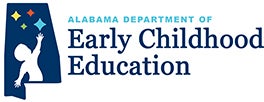Alabama’s Preschool Development Grant,
Birth through 5
On behalf of the state of Alabama and with designated authority from the Office of the Governor, the Alabama Department of Early Childhood Education applied for the Preschool Development Grant, Birth Through Five (PDG B-5) through the United States Departments of Health and Human Services and Education on November 2, 2018. The Department received notice of the federal grant award of $10.6 million on December 31, 2018.
On November 1, 2019, the department applied for a renewal of the state’s PDG B-5. On December 18, 2019, the department was notified of a $33 million grant award by the U.S. Department of Health and Human Services and the Department of Education for a renewal of Alabama’s PDG B-5 initiative over the next three years.
On December 31, 2022, Alabama was once again awarded PDG B-5 funding via a $4 million planning grant. In August 2023, Alabama received an additional $860,000 in supplemental PDG B-5 funding.
With the support of the PDG B-5 renewal grant and planning grant Alabama will continue longstanding efforts to expand access to high-quality early childhood care and education for all children. In 2023, the Alabama Department of Early Childhood completed a comprehensive needs assessment of early care and education needs in the state of Alabama and updated the strategic plan to meet these needs. The PDG B-5 funding will ensure Alabama continues to deliver high-quality early childhood care and education while expanding access to programs that support all children, especially low-income, rural, disadvantaged children.
The stated purposes of the PDG B-5 initiative are:
- Develop, update or implement a strategic plan that facilitates collaboration and coordination among existing programs of early childhood care and education in a mixed delivery system across the state;
- More efficiently use existing federal, state, local, and non-governmental resources to align and strengthen the delivery of existing programs;
- Encourage partnerships among the wide range of early childhood education programs and service partners that make up the B-5 Early Childhood State System;
- Expand parental choice and knowledge about existing programs; and enhance school readiness for children from low-income and disadvantaged families, including during children’s transition into elementary school by sharing best practices between and among early childhood education providers.

